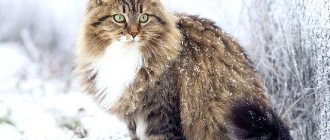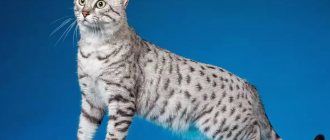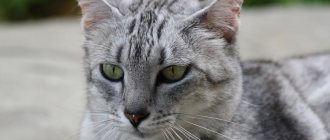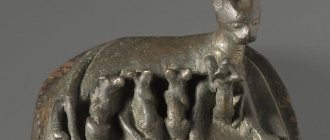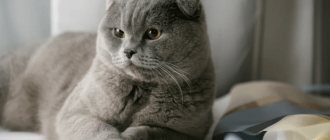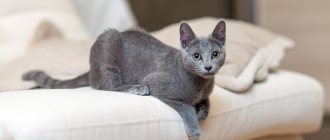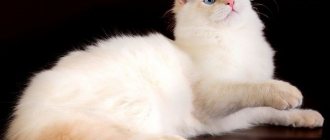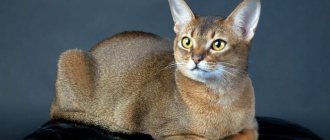The Egyptian Mau is the oldest breed, having been around for at least 3,000 years. Despite its almost complete extinction by the beginning of the twentieth century, now this breed is thriving and arousing the most lively interest.
In general, many breeds of cats were bred in Egypt, but this Egyptian Mau, thanks to its pretty appearance, unusual history of origin and unpretentiousness in everyday life, became the dream of all cat lovers in the world.
Brief history of the breed
The Egyptian Mau is one of the oldest breeds. It is believed to have descended from the African wild cat.
Residents of the Nile Valley noticed that where spotted cats live, there are practically no mice and rats, which means that grain reserves remain intact, and epidemics of deadly diseases quickly die out. People began to gradually domesticate these animals, and by the time of the advent of the New Kingdom, the Mau were not only completely domesticated, but also began to be considered sacred.
Figures of cats similar to modern Mau are found on most ancient Egyptian bas-reliefs. They were painted next to images of pharaohs and their wives. Killing these animals was punishable by law. And the mummy of the deceased cat was placed in an expensive sarcophagus and buried with honors.
With the disappearance of the great dynasties of the pharaohs, the Mau cult came to naught and by the beginning of the 20th century it could only be learned about from legends and historical literature. However, the cats themselves have not gone away. They still lived in Egypt and even in Europe. But after World War II, their existence was under threat.
The revival of the Egyptian Mau began with the light hand of Natalia Trubetskoy. When a Russian princess accidentally ended up with a cat that looked like animals from ancient bas-reliefs, the woman began to study the history of these graceful creatures. Later, thanks to a high-ranking diplomat, the princess received another pair of Mau from Egypt - a male and a female. Having moved to America, Trubetskoy opened the Fatima cattery and in 1968 registered the Egyptian Mau cat breed with the CFA.
Choosing and purchasing a kitten
A small breed in Russia. You can buy guaranteed purebred kittens in the USA or Europe. The average price for a baby is from 2,000 to 4,000 euros. The cost is influenced by gender, age, exterior characteristics, origin and health of the parent couple and many other factors.
Some kittens from birth look fluffy with disheveled fur without a distinct pattern. This feature is considered the norm and is justified by evolutionary necessity. Ancient ancestors hid their babies in short, sparse grass, so the cubs have a texture and coat color that is as close as possible to dusty, dry land with sparse vegetation. With age, the vellus hair fades, and cats will look like small domestic leopards.
Interesting Facts
During the existence of the Egyptian Mau, many interesting things have been associated with the breed:
- Once upon a time, the most ancient cats were identified with deities. They were worshiped during life, they were mourned after death. To perpetuate the memory of a departed cat, the owner shaved off his eyebrows and reproduced her image on papyrus.
- Egyptian Mau cats have a quiet, musical voice. When they are in a good mood, they make sounds similar to birds giggling or chirping.
- The Mau had a special place in ancient Egyptian culture. Archaeologists managed to discover an ancient cat cemetery with 1,800 places. The mummified remains of the Mau were found there, encased in silver and gold sarcophagi.
How much is the Egyptian Mau worth?
The Egyptian Mau breed is one of the rarest and most expensive. The price of a cat starts from 50 thousand rubles. The more the animal meets the standard, the higher the cost. You can “save” only on black Egyptian Mau. Since the characteristic spots merge with the main color of the coat, such specimens are considered rejected and are not allowed for breeding work or participation in exhibitions. However, if you are looking for a loyal and cheerful friend, the special color should not be an obstacle to acquiring an Egyptian Mau.
Breed description, standards, appearance
The Egyptian Mau is a massive cat, not without graceful lines. Outwardly, she vaguely resembles an Abyssinian, and her appearance combines mobility and heaviness. A detailed description of the breed is presented in the generally accepted standard.
Dimensions and weight
The Egyptian cat is a medium-sized animal. The breed has developed sexual dimorphism, which is why females are slightly lighter than males. The cat weighs 3-4.5 kg. The cat's weight is 4.5-6 kg.
Anatomical characteristics
A purebred Egyptian Mau looks like this:
- The head is small, wedge-shaped with smooth lines, a rounded forehead and a flat muzzle. High cheekbones, feet without sharp bends or kinks. The chin is small and strong. The nose is wide, with a hump.
- The ears are triangular, wide at the base, with pointed tips. The outside is covered with short hair. Slightly tilted forward.
- The eyes are large, slanting, widely set. Young Egyptian cats have amber colored irises. But after one and a half years it acquires a light green tint.
- The body is elongated, elegant, with developed muscles, a straight back and a smoothly curved neck. The Egyptian Mau has a fold of skin on its belly that makes the cat's movements easier and more flexible. It is implied that thanks to it these cats are able to reach speeds of 48 km/h.
- The limbs are strong and muscular. The front ones are slightly shorter than the rear ones. Paws are oval or rounded.
- The tail is of medium length, gradually tapering from the base to a dark, cone-shaped tip.
Color and coat type
The body of the Egyptian cat is covered with a short, close-fitting awn. Despite the insignificant thickness of the wool, it perfectly protects the animal from bad weather.
On a note. The texture of the coat of Egyptian cats depends on the color. Smoky individuals have smooth and silky fur. Bronze and silver representatives of the breed have a tougher coat.
International standards for Egyptian cats allow only 3 color options. The following colors are acceptable in the breed:
- Smoky with silver undercoat and contrasting points. The main tone is dark gray, almost black.
- Bronze with brown markings on the body and the same tips on the ears. Cream fur grows on the throat, chin and around the eyes. The belly is colored light, almost milky. The bridge of the nose has an ocher, brownish-red color.
- Silver with contrasting points and dark ear tips. White hair grows on the neck, chin and near the nostrils. The nose, eye contours and lip rims are black.
We recommend an interesting article about cats that look like a tiger.
Silver and bronze representatives of the breed are characterized by ticking. But smoky Egyptian cats do not have it.
On a note. The main distinguishing feature of representatives of one of the most ancient cat breeds is the presence of a pattern in the form of a scarab beetle, located on the forehead and between the ears of the Mau.
Possible breed defects
Disadvantages of the exterior, in the presence of which the Egyptian cat will not receive a high expert assessment:
- small eyes;
- merging marks;
- excessively large or small ears;
- points in the form of stripes;
- no spots on the belly;
- small or round head;
- thin or short tail;
- undeveloped chin;
- pointed or short muzzle.
Disqualifying faults:
- white points;
- lack of ticking in silver and bronze individuals;
- “medallions” on the chest;
- ticking in smoky individuals;
- atypical eye pigmentation;
- complete absence of stains;
- deformed bone;
- cryptorchidism (in males);
- deafness;
- amputated claws.
Color
An interesting color feature is the silhouette of a scarab beetle, which is located on the forehead.
There are three main types of coloration of the Egyptian Mau.
- Bronze. The base tone is dark brown to ivory. The design is made in dark brown, and the edging of the eyes and nostrils is cream.
- Silver. The main color is gray and light gray. The edging of the eyes and nostrils is black. The pattern is made in dark gray and black.
- Smoky. The main color is from dark gray to black. Drawing in black.
There are cases when both black and marbled maus are born. Non-standard colors are called “wild”. And unfortunately, cats of this color cannot participate in breeding.
Character and temperament
Egyptian cats are balanced animals that cope well with the role of a companion. Mau quickly get used to people, although they do not suffer from prolonged separation. Energetic representatives of the breed poke their curious noses everywhere and cannot sit still for long.
The Egyptian Mau has an ambiguous character. A developed sense of self-esteem prevents her from silently enduring annoying advances. Therefore, it is not recommended to have a cat of this breed for families in which children are growing up. But the Egyptian Mau can easily find a common language with older children.
Representatives of the breed get along without problems not only with their relatives, but also with friendly dogs. But Egyptian cats consider fish, ornamental rodents and birds as prey and actually hunt for them.
Breeding work
The parental instincts of this breed are highly developed - so much so that many cats help cats during childbirth, and then take on part of the responsibilities of raising the younger generation. For representatives of the cat family, such behavior is very rare. But for the owners, watching the relationships in a large family of Egyptian Mau is a great pleasure.
The Egyptian cat manifests itself as a very caring mother; she is ready to accept even other people's kittens into her nest, which for some reason were left without natural feeding. But when the children reach two months of age, the mother weans them from feeding and begins to encourage them to be independent - sometimes in a rather strict form.
Preparation and carrying out mating
If you are the happy owner of a breeding cat, prepare it for mating in advance. Egyptian Mau, like all cats of aboriginal origin, mature quite early, so the animal can be bred already on the third heat. A mandatory requirement for admission to breeding is participation in club shows and receiving high breeding ratings at them.
On the eve of the intended mating, both producers are required to undergo an examination by a veterinarian. Future parents must be promptly vaccinated and treated against all types of parasites.
Correct selection of sires is the basis of breeding work
The gene pool of this rare breed is still very small, which makes the correct selection of a breeding pair all the more important. Be sure to consult on this matter with a breeder who is knowledgeable in detail about the heredity of the animal sold to you and will select the best partner for him to produce healthy and beautiful breed offspring.
The cat for mating is brought to the cat’s territory, where he feels especially confident. Mating games can last from three to five days. There is no need to help the animals in any way - they will perfectly find a common language on their own, without human intervention.
Nuances of breeding
Problem-free in all respects, the Egyptian Mau does not create any particular difficulties in matters of breeding. Matings are, for the most part, successful, and the process of pregnancy and childbirth proceeds as usual; the help of a veterinarian is usually not required.
Mau cats give birth without problems and raise children well.
A peculiarity of breeding work with Egyptian Mau is that breeding can involve animals with a color that is not purebred, at first glance - black, with indistinct spots. The decision to include such an individual in breeding programs can only be made by professional felinologists who are well versed in issues of breed genetics.
To preserve the purity of the breed and to further improve the gene pool, sterilization of pet-class animals is a common condition for their sale. The operation is most often performed at eight months of age, preferably not at home, but in a veterinary clinic, followed by medical supervision and monitoring of the sterilized animal during its rehabilitation period.
Video: Egyptian Mau with kittens
How to choose the right kitten
To be sure that your Egyptian cat is purebred, it is advisable to buy it from a specialized nursery or from a trusted breeder. It’s better to choose a baby not based on photos and videos, but in person.
This way, the potential owner of an Egyptian Mau kitten will have the opportunity to personally check the availability of documents confirming that they belong to the breed and evaluate the living conditions of the animals.
Kids should be actively interested in everything that happens around them and play with each other. Healthy Egyptian kittens should have clear eyes, clean ears, soft bellies, smooth skin without scratching, and a uniform coat without bald spots. It is important that little Mau do not have dirt under their tails or bad breath.
Kitten care
Until 12 weeks, kittens live with their mother. By the time they move to a new home, little Mau are already completely independent. They eat many foods with appetite, know how to use a scratching post and are litter trained. Therefore, new owners can only give the Egyptian kitten time to get used to the changed conditions and show where the tray with filler and bowls with water and food are located.
For safety reasons, all wires, household chemicals, ornamental plants, fragile and small objects are removed from the playful pet.
In order for an Egyptian kitten to grow well and develop properly, it is provided with adequate nutrition. And the Mau feeding schedule is set taking into account its age:
- up to 2 months – 5-6 times a day;
- 2-5 months – 4 times a day;
- 5-12 months – 3 times a day.
A one-year-old Egyptian cat is being fed twice a day.
Choosing a kitten
The cost of a kitten of this rare and prestigious breed ranges from one to three thousand euros. The high cost and growing demand create the risk that, under the guise of a purebred animal, an inexperienced buyer may be offered only an individual that looks similar to it.
This baby is very expensive
My friends have a gorgeous cat who looks like a typical silver Mau, with all the characteristics that meet the standard. The cat was given to them by a relative from Israel: he simply picked up a nobody’s kitten on the street, filled out the required veterinary documents, and delivered it to his relatives by plane on his next visit. It is clear that this is a mongrel animal, but even an experienced expert, who was shown the cat out of curiosity, doubted its origin. Needless to say, when choosing a kitten, questions may arise regarding its breed.
How to check your breed
You should purchase a Mau kitten no earlier than three months of age after full vaccination and appropriate quarantine. Before choosing your future pet, carefully study the breed standard and, if possible, consult with a felinologist about the exclusive features of the Egyptian Mau.
When choosing a kitten, pay attention to special breed characteristics
Pay close attention to the kitten's face: it should be triangular, with large ears positioned correctly. On the forehead, in the area of the “third eye,” there should be a clear pattern in the shape of a large letter M, and on the back of the head, just behind the ears, in the shape of a W.
An important breed difference is also the characteristic long fold on the skin between the hind legs - it is clearly visible in kittens already in infancy.
The baby fluffiness of the Mau will go away with age, but the pattern in the shape of the letter M on the forehead will remain
The so-called phasing (fuzzy translated from English as “unclear”) can create considerable problems with the choice for a non-specialist. In the period from two to six months of age, the kitten's fur changes color and changes from baby to adult. It looks quite untidy: the hairs grow unevenly, become long and hide the brightness of the color. This is a completely normal phenomenon during the transition period - after six months the coat will completely change, the coat will become smooth, silky and very beautiful.
The only guarantee that you are purchasing a truly high-breed animal is to purchase a Mau not second-hand or through an advertisement, but from a professional nursery. Not many breeders are still involved in breeding work with this rare breed in our country; each of them values their honest name and authority - you will definitely not be deceived in the nursery.
Video: Egyptian Mau kitten
Care and maintenance
Egyptian Mau are unpretentious cats that quickly adapt to different conditions. They can be kept in a spacious country house or in a small city apartment. Representatives of the breed are characterized by increased cleanliness, so caring for them does not take much time and effort.
To keep the short hair of the Egyptian Mau looking neat, it is brushed 2-3 times a week with a special brush or mitten. This simple procedure will help get rid of dead hair and strengthen the hair follicles. Representatives of the breed are bathed no more than once a quarter, and some owners do not give their Mau baths at all.
The eyes and ears of the Egyptian cat are wiped with damp cotton swabs as needed and periodically inspected for unusual discharge.
Mau teeth are cleaned 1-2 times a month using a non-foaming paste applied to a brush or a special attachment. This simple procedure will prevent the formation of stones and help remove yellowish plaque.
As they grow, the claws of the Egyptian Mau are shortened with a claw clipper, and sharp edges and jagged edges are sharpened with a nail file.
Catering
Mau love to eat and, if you don’t watch them, they very soon turn into real “koloboks”.
Recommended food
Breeders advise feeding cats of this breed with holistic and super-premium industrial food.
Holistic
Holistic food: Acana, Orijen, Savarra. They contain a good vitamin and mineral supplement, fresh and dehydrated meat, fish fillet, rice, lentils, tocopherols, vegetables and berries.
Super premium
Super premium food: 1st Choice, Leonardo, Superpet. The composition of these foods is similar to holistic foods, but the percentage of meat and nutrients is lower. Potatoes, barley, and pea protein can also be used.
Below are the recommended holistic and super-premium foods. Links with the names of the food are clickable, on them you can, within our website, get acquainted with the descriptions of the food and read reviews from owners of Egyptian Mau cats.
| Holistic | Super premium | Super premium |
| AATU | Brooksfield | Duke's Farm |
You need to buy premium and economy food after weighing all the pros and cons. They contain few useful substances, but there is a lot of vegetable protein, which often causes an allergic reaction. If necessary, you can pay attention to the following foods: Native foods, Perfect Fit, Whiskas.
A cat needs 2 bowls: for food and for water. Both are shallow (the animal’s whiskers should not bend when eating), made from natural, odorless materials.
Natural products
If you want to feed your cat natural food, remember the following.
- The percentage of protein products should be high.
- It is necessary to give lean meat (chicken, veal, beef, turkey and rabbit, lamb).
- By-products (liver, hearts, ventricles, chicken necks).
- Porridge with water (buckwheat, oatmeal, rice, pearl barley, rice).
- Boiled or stewed vegetables (carrots, pumpkin, zucchini, asparagus, lettuce, parsley).
- Add a couple of drops of vegetable or olive oil to the porridge.
- Pamper your cat with cottage cheese, cream, fermented baked milk or natural yogurt 4-5 times a week.
- Unsalted cheese, squid, shrimp, chicken (boiled yolk) and quail eggs are allowed.
- You can feed fish no more than once a week and only sea fish (salmon, hake, trout).
- Dry brewer's yeast is given to your pet in courses.
There should be 80 kcal per kilogram of body weight, but pregnant and lactating cats and kittens, weakened after illness, need a more enhanced menu.
It is prohibited to give:
- Pork, goose and duck meat (firstly, this meat is often contaminated with parasites, and secondly, it is too fatty and difficult to digest);
- River fish;
- Offal, lard, bones, skin;
- Spices, mayonnaise, sauces, seasonings;
- Peas, beans;
- Eggplants, potatoes, tomatoes, avocados, grapes, bananas;
- Dog food;
- Alcohol, tea, coffee, cocoa, mineral water, soda, juices;
- Whole milk, fermented milk products with preservatives and harmful chemical compounds;
- Nuts, mushrooms, raw chicken liver;
- Smoked, salty, sweet foods, canned food for people, human vitamins;
- Baking, flour.
Water for drinking is purified, at a comfortable temperature (neither cold nor hot). Wash bowls after each meal, change water 2 times a day: morning and evening.
Feeding the cat
The Egyptian Mau can be given both commercial and natural food. When feeding dry food to a cat, premium or super-premium products are selected, which do not contain dyes, preservatives or other dubious additives.
The following brands of food best fit these criteria:
- Pronature;
- Hills;
- Brit Care;
- Gemon.
With the natural type of feeding, the Egyptian Mau is given predominantly lean, fresh meat. Also included in the cat’s diet:
- boiled vegetables;
- porridge with water;
- offal;
- eggs;
- dairy products;
- lean sea fish.
Egyptian cats should not be fed sausages, bones, sweets, baked goods or mushrooms. Also, representatives of the breed are prohibited from giving river fish, pickles, smoked meats and any food from the master’s table.
Features of feeding and diet
An active, playful cat requires high-quality nutrition that will allow it to replenish lost energy. The daily diet should contain at least 90 kcal per kilogram of animal weight.
Due to the Egyptian Mau's proneness to allergies, only specially formulated premium foods can be fed. If dry food is not your choice, you can stick to natural food. What is recommended for Egyptian women to eat:
- rabbit meat, chicken;
- sea fish without bones;
- offal;
- low-fat cottage cheese, sour cream;
- cereal porridges;
- boiled vegetables.
It is worth taking care of the availability of fresh, clean water. You can use purified bottled water. Cats have inherited from their ancestor, the African wild cat, the instinct to determine whether water is suitable for drinking or not. To do this, the animal wets its paw in a bowl and tastes the liquid.
Education and physical activity
Egyptian Mau are endowed with high intelligence and excellent memory. Cats of this breed quickly understand what is required of them. They get used to the tray and scratching post without any problems. If desired, the Mau can be trained to walk on a leash and learn to follow simple commands.
Egyptian cats have an energetic temperament. Active and jumping Mau easily overcome obstacles and climb high furniture.
To realize hunting instincts, representatives of the breed can purchase several interactive toys. And to maintain the physical shape of the Mau, it is recommended to equip a corner with multi-level platforms and ladders.
Mr. Cat recommends: living with other animals
Mau cats get along differently with other pets. More often it depends on the individual character of the animal. They get along well with other cats, but it is not recommended to keep representatives of Asian breeds with them. Both are self-sufficient leaders, which means competitive behavior can develop between cats.
Mau dogs get along worse with dogs, preferring to ignore them. Jealous individuals can openly provoke dogs into aggression.
It is best to keep birds and rodents as far away from Egyptian cats as possible. The hunting instinct will not allow them to come to terms with the smells and sounds of potential prey. The presence of a mouse and a bird in the house one way or another threatens trouble. Either the cat will get there and eat it, or it will experience severe anxiety, which can turn into neurosis.
Health and susceptibility to disease
Egyptian Mau have good immunity and live on average about 16 years. Although these cats are in good health, they are predisposed to certain pathologies. Most often, representatives of the breed are diagnosed with the following diseases:
- asthma;
- dystonia;
- subluxation of the kneecap;
- cardiomyopathy.
On a note. Some breed lines have a predisposition to allergies. Therefore, before purchasing an Egyptian Mau, it is advisable to clarify this point with the breeder.
Health of the Egyptian Mau
Kittens are resting
Spotted Cleopatras have strong immunity, so they rarely suffer from common “animal” ailments. In the middle of the 20th century, when the breed was just entering the international arena, its representatives suffered from asthma and cardiovascular diseases. However, breeders have worked hard to keep these occurrences to a minimum with each new litter. Diseases are now quite rare, but the vulnerability of the Egyptian Mau's respiratory system has not disappeared. It is strongly recommended to protect your pet from smoke, dust and strong odors.
The main scourge of the breed remains allergies. If red spots appear on your cat's body, you need to change its diet as soon as possible and consult a veterinarian for advice.
Vaccinations and antiparasitic treatment
To prevent infectious and viral diseases, the Egyptian Mau is regularly administered a complex vaccine against calcivirosis, rhinotracheitis and panleukopenia. The first vaccination is given to a kitten at the age of 7-8 weeks. After 4 weeks, he will be revaccinated against the same diseases and against rabies. In the future, the Egyptian Mau is vaccinated once a year.
To protect your cat from diseases carried by parasites, it is regularly treated for fleas and helminths. Antihelminthic drugs for the Egyptian Mau are given once every six months with mandatory repetition after 10-14 days.
For fleas, a cat of this breed is treated with special drops or shampoos. And if the Mau regularly goes outside, she is additionally put on an anti-parasitic collar.
How many years do they live?
With a well-chosen diet and proper care, the life expectancy of Egyptian Mau is on average 13-15 years.
Expert opinion
Dusheba Vera Ivanovna
In 2010, she graduated from the Moscow State Academy of Veterinary Medicine named after K.I. Scriabin with honors, specializing in veterinary medicine. I regularly attend veterinary conferences, congresses, and webinars.
When choosing a kitten, be sure to ask to show you the parents: both mother and father. You can reserve a kitten before birth, but you should pick up the baby no earlier than 6-8 weeks after birth. By this time, his immunity will have already formed, the breeder will teach him to eat and go to the litter box on his own.
Pros and cons of the breed
Like any other cat breed, the Egyptian Mau has its own advantages and disadvantages.
| pros | Minuses |
| High intelligence | Independent character |
| Visual appeal | The habit of loudly expressing emotions |
| Cleanliness | High cost of kittens |
The Egyptian Mau is a beautiful green-eyed cat with an exquisite spotted coat. She is endowed with a playful character and developed hunting instincts. Due to its active temperament and natural curiosity, a cat of this breed will be an excellent companion for people who dream of an attractive and energetic pet.
Psychology
The Abyssinian cat is by nature agile, strong, flexible and active. Add to this curiosity and the desire to attract attention to your person.
If you are reading, it will sit on your lap; if you are writing, it will begin to rub against the pen, if you are typing on a computer - there is currently no better place for it than the keyboard.
This breed is distinguished by intelligence comparable to Scottish Straight cats and Scottish Fold cats , and an almost constant playful mood.
He likes to follow what is happening on the TV or monitor screen, and easily accepts the rules of cat behavior in the house.
The Abyssinian cat is very inquisitive. He definitely needs to know what is going on around him, what the owner is doing at this moment
The Abyssinian's appearance is wild, and in theory this is how his character should be. But no.
He will not scratch for no apparent reason, use his claws, or meow heart-rendingly, demanding attention.
A little effort and she won’t damage the furniture with her claws or climb the curtains to the ceiling.
The cat is very clean, so it will be very easy to train her to use the litter box .
How to choose toilet filler is described in the article
The only thing she constantly lacks is attention. She will follow you everywhere: into the room and corridor, onto the balcony and into the kitchen.
When meeting its owner, the cat will invariably say hello by purring affectionately.
Owners and breeders of Abyssinian cats note that their pets have an even and noble character.
The Abyssinian cat is very clean, so litter box training will be easy. He himself doesn’t like it when things are dirty.
Owner reviews
To form an objective opinion about the breed, it is useful to study reviews from owners who have significant experience in keeping Egyptian Mau.
Almost everyone notes a playful and peaceful character. External beauty and sophistication also leave no questions - it’s stupid to argue with that. Many people also like that caring for a cat is simple - much easier than most other purebred pets. If you start it in a private house, then the mice will quickly run out or they will prefer to stay away from such a dangerous place.
There aren't many disadvantages. One of them is a sociable nature, sometimes turning into obsessive. Wherever the owners go, the pet will follow them. And if you close the door in front of your nose, then she will not hesitate to let out a loud “mau”. Moreover, the cat has an excellent voice and can produce nasty, drawn-out roulades.
So, you should think seriously before getting such a pet.
Application
What use can a cat have other than being a pet? But the Egyptian Mau can boast of hunter skills.
Thanks to its excellent eyesight and hearing, the animal, like the bobtail-Kuril cat , deftly hunts for small rodents.
In addition, this breed is a real running champion among cats. There is no other breed that can reach speeds of up to 58 km/h.
The Egyptian Mau is a true running champion among cats. There is no other breed that can reach speeds of up to 58 km/h
Chausie
This breed was created by crossing the Nile cat with domestic breeds. Chausie cats have been found in several ancient Egyptian temples, indicating that the Egyptians valued them even before they were bred into the Chausie we know today.
This is one of the largest breeds of domestic cats, sometimes weighing up to 11 kg. This is one of the few cat breeds that love water. In 2013, the International Cat Association finally registered the breed.
